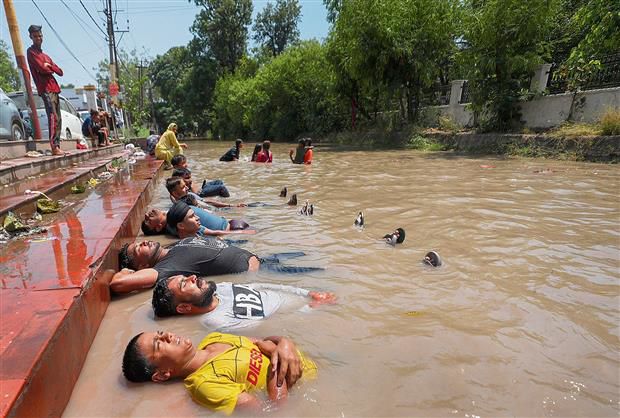Heatwave to Persist Until May 29th, Brief Respite Predicted Before Return
Jammu and Kashmir are experiencing a brutal heatwave, with several areas recording their second-highest temperatures in decades. Qazigund in south Kashmir reached a scorching 33.5°C (92.3°F) on Sunday, just shy of the 43-year record of 33.6°C (92.5°F) set in 1981. Jammu City also sweltered under record-breaking heat, reaching 42.8°C (109°F), exceeding the normal temperature by 3.7°C (6.7°F).
Heat Expected to Linger, Relief May Be Short-Lived
The India Meteorological Department (IMD) predicts these scorching conditions will continue until May 29th. However, a glimmer of hope emerges with a slight reprieve expected from May 30th to June 2nd, particularly in the hilly regions of Jammu and most parts of Kashmir. Unfortunately, the IMD warns of another heatwave returning on June 3rd, urging residents to remain cautious and take necessary precautions.
Nighttime No Escape: Temperatures Above Normal
Even nights offer little respite, with minimum temperatures exceeding normal averages. Srinagar, for example, recorded a low of 15.7°C (60.3°F), 3.7°C (6.7°F) above normal. Similar trends were observed across other locations in the region.
Precautions Advised as Temperatures Rise
The IMD has issued advisories urging residents to take precautions against heat-related illnesses. Staying hydrated, avoiding prolonged sun exposure during peak hours, and seeking medical attention for symptoms of heat exhaustion or heatstroke are crucial steps to ensure safety during this intense heatwave.
Record-Breaking Temperatures Raise Concerns About Climate Change
These unprecedented temperatures are raising concerns among residents and authorities alike. The increasing variability in weather patterns is a potential indicator of the effects of climate change. The government and health officials are actively advising people to prioritize their well-being during this challenging period.
Night Temperatures Above Normal
Srinagar recorded a minimum temperature of 15.7 degrees Celsius, up from 13.8 degrees Celsius the previous night, which is 3.7 degrees Celsius above the normal for this time of year.
Qazigund recorded a minimum of 12.6 degrees Celsius against 10.4 degrees Celsius the previous night, 1.9 degrees Celsius above normal.
Pahalgam experienced a low of 8.3 degrees Celsius, compared to 7.3 degrees Celsius the previous night, 2.2 degrees Celsius above normal.
Kokernag recorded a minimum temperature of 13.2 degrees Celsius, up from 11.1 degrees Celsius the previous night, 2.6 degrees Celsius above normal.
Kupwara town recorded a minimum of 11.5 degrees Celsius against 11.3 degrees Celsius the previous night, 0.9 degrees Celsius above normal for the place.
Gulmarg recorded a low of 11 degrees Celsius, compared to 9 degrees Celsius the previous night, 3.9 degrees Celsius above normal.
In Jammu, the minimum temperature was recorded at 24.5 degrees Celsius, up from 22.4 degrees Celsius the previous night, which is 0.4 degrees Celsius below normal.
Banihal recorded a low of 15 degrees Celsius, Batote 18.4 degrees Celsius, and Bhaderwah 15.4 degrees Celsius.



